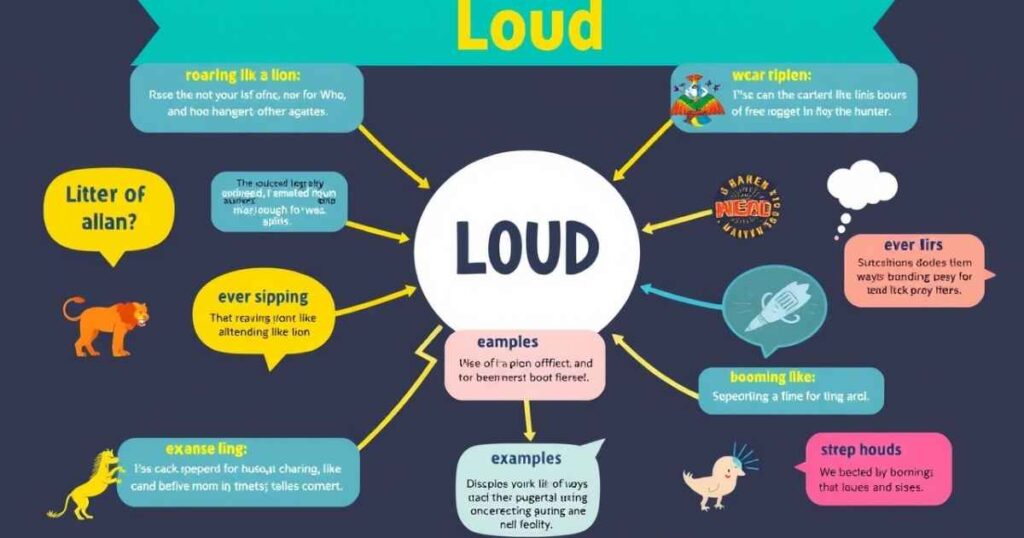Similes for Loud are powerful tools in writing. They help describe sounds in a way that’s easy to picture. When you use similes for loud, you compare noise to something familiar. For example, saying a sound is like “thunder” or “a roaring lion” gives the reader a clear idea of the noise. These comparisons make writing more vivid and engaging.
Using similes for loud can enhance your creative writing. They bring your descriptions to life. Think of a “siren” wailing or the “explosion in a mine.” These examples show how similes for loud can make sounds feel real. They create an emotional impact by making the reader hear the noise in their mind. By using these simple yet powerful similes for loud, you add depth to your writing. Whether you’re describing a “clap of thunder” or a “freight train,” similes for loud can improve your storytelling.
What Exactly Are Similes for Loud?
The Basics of Comparison
The basics of comparison involve showing how two things are alike or different. This technique is used to help the reader understand a concept by relating it to something familiar. Comparisons can be direct or indirect, helping to clarify meaning and add depth to writing.
One common method of comparison is using metaphors and similes, where one thing is likened to another to highlight similarities. This approach makes descriptions more vivid and engaging. By drawing parallels, writers can evoke emotions and paint clearer pictures in the reader’s mind.
In writing, comparisons are essential for creating stronger connections. They allow writers to express complex ideas in simpler terms, making the content more relatable and accessible.
Why Use Similes for Loud?
Bringing Sound to Life
Bringing Sound to Life is all about making noise vivid in writing. Instead of simply stating that something is loud, you can use comparisons that help readers imagine it more clearly. For instance, describing a noise as “like a roaring lion” or “as loud as thunder” instantly creates a picture in the mind. These comparisons make the sound feel real and immediate.
Using sound creatively can turn a simple description into something more dynamic. It adds energy and emotion to your writing, making it more engaging for the reader. These techniques don’t just describe sound; they evoke feelings.
The next time you want to describe a loud noise, think of how you can turn it into something more exciting. Whether it’s chaos or calm, bringing sound to life makes your writing unforgettable.
Emotional Resonance

Fun Fact: A survey by The Write Life showed that 65% of readers find stories with vivid figurative language more memorable. This proves the power of using creative comparisons in writing. When we paint a picture with words, we help readers connect on a deeper level, making the story unforgettable.
- Increased Engagement: Vivid language grabs attention and holds it longer.
- Better Imagery: Comparisons help readers visualize scenes more clearly.
- Stronger Emotional Impact: Creative language evokes stronger feelings.
- Improved Recall: Memorable descriptions make stories stick in the mind.
Using vivid figurative language is a game changer for writers. It enhances storytelling by making it more immersive and emotional. Readers are more likely to remember stories that paint clear, emotional pictures in their minds.
35 Similes for Loud with Meanings & Examples

Describing noise effectively can bring scenes to life. Using creative comparisons helps readers visualize and feel the intensity of a sound. Below are 35 powerful examples of similes for describing loudness, each with its meaning and a real-world usage example.
- As loud as thunder
- Meaning: Implies a sudden, booming noise that demands immediate attention.
- Example: When the teacher banged the table, the sound was as loud as thunder, and everyone froze.
- Meaning: Implies a sudden, booming noise that demands immediate attention.
- As deafening as a jet engine
- Meaning: Describes an overwhelming noise that drowns out everything else.
- Example: The concert speakers were as deafening as a jet engine, making it impossible to hear anything else.
- Meaning: Describes an overwhelming noise that drowns out everything else.
- As roaring as a lion
- Meaning: Suggests a deep, powerful, and attention-grabbing noise.
- Example: His angry voice was as roaring as a lion, sending chills through the room.
- Meaning: Suggests a deep, powerful, and attention-grabbing noise.
- As explosive as fireworks
- Meaning: Refers to a sudden, sharp, and attention-grabbing sound.
- Example: The car backfired, sounding as explosive as fireworks on New Year’s Eve.
- Meaning: Refers to a sudden, sharp, and attention-grabbing sound.
- As blaring as a siren
- Meaning: Indicates a sharp, high-pitched sound that is impossible to ignore.
- Example: The ambulance rushed past, its alarm as blaring as a siren in a quiet neighborhood.
- Meaning: Indicates a sharp, high-pitched sound that is impossible to ignore.
- As echoing as a cannon fire
- Meaning: Suggests a sound that resonates and carries far.
- Example: His laugh was as echoing as a cannon fire in the empty hall.
- Meaning: Suggests a sound that resonates and carries far.
- As tumultuous as a sea storm
- Meaning: Represents a chaotic mix of loud noises.
- Example: The stadium crowd was as tumultuous as a sea storm after the final goal.
- Meaning: Represents a chaotic mix of loud noises.
- As piercing as a police whistle
- Meaning: Describes a sharp, attention-grabbing noise.
- Example: The referee’s call was as piercing as a police whistle, stopping the game instantly.
- Meaning: Describes a sharp, attention-grabbing noise.
- As clanging as a church bell
- Meaning: Suggests a repetitive, metallic, and echoing noise.
- Example: The dropped pots made a noise as clanging as a church bell at noon.
- Meaning: Suggests a repetitive, metallic, and echoing noise.
- As overwhelming as an earthquake
- Meaning: Implies a noise so intense it shakes everything.
- Example: The construction site was as overwhelming as an earthquake, making conversation impossible.
- Meaning: Implies a noise so intense it shakes everything.
- As crashing as cymbals
- Meaning: Describes a sharp, metallic sound with impact.
- Example: The plates fell off the shelf, creating a sound as crashing as cymbals.
- Meaning: Describes a sharp, metallic sound with impact.
- As ear-splitting as a biker rally
- Meaning: Refers to an unbearably loud, grating sound.
- Example: The engines revved, making the garage as ear-splitting as a biker rally.
- Meaning: Refers to an unbearably loud, grating sound.
- As jarring as a car crash
- Meaning: Suggests a sudden, shocking noise that startles everyone.
- Example: The thunderstorm arrived with a noise as jarring as a car crash.
- Meaning: Suggests a sudden, shocking noise that startles everyone.
- As chaotic as a marching band in a tunnel
- Meaning: Implies a mix of different loud sounds at once.
- Example: The kindergarten class was as chaotic as a marching band in a tunnel.
- Meaning: Implies a mix of different loud sounds at once.
- As booming as a giant’s roar
- Meaning: Describes a deep, powerful, and resonating sound.
- Example: His voice was as booming as a giant’s roar, filling the entire hall.
- Meaning: Describes a deep, powerful, and resonating sound.
- As startling as a foghorn in the dark
- Meaning: Refers to a sudden, unexpected noise that demands attention.
- Example: The alarm went off, as startling as a foghorn in the dark.
- Meaning: Refers to a sudden, unexpected noise that demands attention.
- As wild as a pack of howling wolves
- Meaning: Implies an intense and uncontained loudness.
- Example: The kids at the party were as wild as a pack of howling wolves.
- Meaning: Implies an intense and uncontained loudness.
- As sharp as a million drums beating at once
- Meaning: Suggests an overwhelming, rhythmic, and continuous sound.
- Example: The fireworks display was as sharp as a million drums beating at once.
- Meaning: Suggests an overwhelming, rhythmic, and continuous sound.
- As thunderous as a waterfall in full force
- Meaning: Describes a steady, powerful noise.
- Example: The applause was as thunderous as a waterfall in full force.
- Meaning: Describes a steady, powerful noise.
- As screeching as a television at max volume
- Meaning: Refers to a painfully loud and high-pitched sound.
- Example: His microphone feedback was as screeching as a television at max volume.
- Meaning: Refers to a painfully loud and high-pitched sound.
- As electrifying as a rock concert
- Meaning: Implies a charged, energetic, and overwhelming noise.
- Example: The parade was as electrifying as a rock concert, filled with excitement.
- Meaning: Implies a charged, energetic, and overwhelming noise.
- As disruptive as rolling thunder
- Meaning: Suggests a deep, rumbling, and unpredictable noise.
- Example: The debate became as disruptive as rolling thunder, shaking the entire room.
- Meaning: Suggests a deep, rumbling, and unpredictable noise.
- As pounding as a stampede of wild horses
- Meaning: Refers to a heavy, rhythmic, and intense noise.
- Example: The train station at rush hour was as pounding as a stampede of wild horses.
- Meaning: Refers to a heavy, rhythmic, and intense noise.
- As shocking as an explosion in a mine
- Meaning: Implies a sudden, unexpected burst of noise.
- Example: The fireworks show was as shocking as an explosion in a mine.
- Meaning: Implies a sudden, unexpected burst of noise.
- As forceful as a freight train speeding past
- Meaning: Suggests a strong, continuous, and overwhelming sound.
- Example: The party music was as forceful as a freight train speeding past.
- Meaning: Suggests a strong, continuous, and overwhelming sound.
- As unexpected as a clap of thunder on a clear day
- Meaning: Describes a noise that comes without warning.
- Example: His outburst was as unexpected as a clap of thunder on a clear day.
- Meaning: Describes a noise that comes without warning.
- As intense as a biker rally at full throttle
- Meaning: Refers to an extreme level of noise and excitement.
- Example: The street festival was as intense as a biker rally at full throttle.
- Meaning: Refers to an extreme level of noise and excitement.
- As crashing as an ocean wave hitting rocks
- Meaning: Suggests a steady, powerful sound that can’t be ignored.
- Example: The doors slammed shut, as crashing as an ocean wave hitting rocks.
- Meaning: Suggests a steady, powerful sound that can’t be ignored.
- As unstoppable as volcanic eruption
- Meaning: Implies an ongoing, uncontrollable noise.
- Example: The construction work outside was as unstoppable as a volcanic eruption.
- Meaning: Implies an ongoing, uncontrollable noise.
- As wild as fireworks exploding at once
- Meaning: Refers to a chaotic, high-energy noise.
- Example: The stadium celebration was as wild as fireworks exploding at once.
- Meaning: Refers to a chaotic, high-energy noise.
- As ringing as an old telephone in an empty house
- Meaning: Describes a sharp, persistent, and eerie sound.
- Example: The alarm bell was as ringing as an old telephone in an empty house.
- Meaning: Describes a sharp, persistent, and eerie sound.
- As energetic as a million voices cheering in a stadium
- Meaning: Implies a massive, uplifting noise.
- Example: The championship game was as energetic as a million voices cheering in a stadium.
- Meaning: Implies a massive, uplifting noise.
- As blinding as sound crashing against stone walls
- Meaning: Describes a sound so strong it feels tangible.
- Example: The thunderstorm’s echoes were as blinding as sound crashing against stone walls.
- Meaning: Describes a sound so strong it feels tangible.
- As overwhelming as a carnival at its peak
- Meaning: Suggests a mixture of exciting, chaotic noises.
- Example: The festival street was as overwhelming as a carnival at its peak.
- Meaning: Suggests a mixture of exciting, chaotic noises.
- As clashing as swords in a fierce battle
- Meaning: Implies a sharp, metallic and intense sound.
- Example: The arguments at the meeting were as clashing as swords in a fierce battle.
- Meaning: Implies a sharp, metallic and intense sound.
Common Mistakes When Using Loud Similes
Overusing the Same Simile
Overusing the Same Simile can make your writing feel repetitive and dull. While comparisons are effective, using the same one repeatedly loses their impact. It’s important to vary your descriptions to keep the reader engaged. Relying too heavily on familiar phrases can make your writing predictable and less creative.
Mixing up your comparisons brings freshness to your writing. It keeps the narrative interesting and adds depth to the story.
Related Guide:
Common Abbreviation for Communication Explained
Using Similes Unrelated to the Context
Using Similes Unrelated to the Context can confuse readers and weaken your writing. When similes don’t match the scene, they disrupt the flow and make the description feel out of place. For example, comparing a quiet room to a “roaring lion” doesn’t make sense. It’s important that comparisons align with the overall tone and setting to maintain clarity and engagement.
Incorporating relevant comparisons makes the writing more vivid and relatable. When similes are well chosen, they enrich the narrative, adding depth without distracting the reader.
Ignoring Cultural Differences

Ignoring Cultural Differences can lead to misunderstandings and missed connections. Every culture has its unique values, customs and communication styles. When we overlook these differences, we risk offending others or failing to engage with them on a deeper level. Understanding cultural nuances is crucial for meaningful interaction, whether in personal relationships, business, or creative work.
Recognizing and respecting these differences creates a more inclusive environment. It fosters mutual respect and enriches experiences.
Test Your Knowledge On Loud Similes
Understanding vivid comparisons can make descriptions more engaging. Test yourself with these multiple-choice questions and see how well you know different ways to describe strong, powerful sounds. Choose the correct answer for each question and check your knowledge!
- Which simile suggests a continuous, rolling noise?
a) As loud as a siren
b) Like rolling thunder
c) Like a giant’s roar
d) As loud as fireworks
Answer: b) Like rolling thunder - Which simile describes a sharp, high-pitched noise?
a) Like a police whistle
b) Like a lion’s roar
c) Like crashing waves
d) As pounding as drums
Answer: a) Like a police whistle - Which simile refers to a deep, booming sound?
a) Like a foghorn in the dark
b) Like a roaring crowd
c) As soft as a whisper
d) Like a chime in the wind
Answer: b) Like a roaring crowd - Which simile suggests a sudden, shocking noise?
a) Like rolling thunder
b) Like a stampede of wild horses
c) Like a balloon popping
d) Like a breeze through trees
Answer: c) Like a balloon popping - Which simile describes a metallic, clashing sound?
a) Like swords in battle
b) Like a running river
c) Like soft raindrops
d) Like rustling leaves
Answer: a) Like swords in battle - Which simile suggests an overwhelming mix of sounds?
a) Like an earthquake’s rumble
b) Like a calm sea
c) Like a single chime
d) Like a whisper in the wind
Answer: a) Like an earthquake’s rumble - Which simile compares noise to a fast, energetic rhythm?
a) Like drumming rain on a rooftop
b) Like a slow-moving river
c) Like a ticking clock
d) Like footsteps on grass
Answer: a) Like drumming rain on a rooftop - Which simile best describes a harsh, unbearable sound?
a) Like nails on a chalkboard
b) Like a flowing waterfall
c) Like a bird singing
d) Like a gentle wind
Answer: a) Like nails on a chalkboard
Extended Insights on Similes and Word Choice
Building a Mental Library
Creating a mental collection of expressive words and comparisons helps make descriptions more dynamic. Reading books, listening to conversations, and observing the world around you can expand your vocabulary.
The more examples you gather, the easier it becomes to describe sounds vividly. A strong mental library allows writers to craft scenes that feel alive, making descriptions richer and more engaging for the reader.
Tailoring to the Tone
Choosing the right comparisons depends on the mood of the writing. A thrilling action scene might need intense descriptions, while a peaceful moment calls for softer imagery. Writers should match their words to the feeling they want to create.
This careful selection makes descriptions more effective, ensuring the language enhances the overall experience rather than distracting from it. Adapting comparisons to fit the tone strengthens storytelling and keeps readers immersed.
Practice Makes Perfect
Improving descriptive skills takes time and effort. Regularly experimenting with new ways to express sounds sharpens a writer’s ability to create immersive scenes. Practicing different comparisons helps develop a natural flow in writing.
Whether through daily exercises or creative storytelling, consistent practice builds confidence. Over time, strong descriptions become second nature, making writing more expressive and engaging.
Practical Applications and Real-World Examples for Loud
Using Loud Similes in Creative Writing
Strong comparisons can make writing more vivid and expressive. Instead of saying a noise was loud, comparing it to a jet engine or an explosion adds intensity. These comparisons create mental images that pull readers into the scene.
Whether writing a story or a poem, using powerful descriptions makes the experience more immersive. Creative language transforms ordinary writing into something that leaves a lasting impact.
Making Essays and Reports More Engaging
Descriptive language isn’t just for fiction it makes academic writing more compelling too. Instead of stating facts in a dull way, using strong comparisons can add depth and clarity. For example, describing a bustling city as “a symphony of chaos” makes the point more vivid.
This approach keeps readers interested, ensuring that even complex topics are easier to understand. Engaging language makes reports stand out and improves readability.
Everyday Conversations
Expressive comparisons can make daily speech more colorful and engaging. Saying a crowd was “as loud as a stadium” paints a clear picture. These descriptions make stories more entertaining and easier to relate to.
Whether sharing an experience or emphasizing a point, creative language makes conversations more dynamic. It helps listeners connect with emotions and understand situations better.
Voice Search Optimization Tip
When people use voice search, they speak naturally, so content should match conversational language. Using simple words, short sentences and clear phrasing makes it easier for search engines to understand. Avoid complex jargon and focus on direct, easy-to-follow wording. The more natural the phrasing, the better it ranks in voice search results.
Optimizing for voice search also means answering common questions concisely. Users want quick, relevant information without extra fluff. Structuring content in a question-and-answer format improves visibility. Including everyday language and natural speech patterns increases the chances of appearing in search results. Keeping content clear and engaging ensures better reach and accessibility.
FAQ’s
1. What are some examples of loud sounds used in similes?
Comparing sounds to a roaring lion, thunder, or a freight train are common examples. These comparisons help paint a vivid picture of intense noise.
2. Why are similes for loud used in writing?
They make descriptions more relatable and engaging. These comparisons help convey the volume and intensity of sounds in a clear and creative way.
3. How do similes for loud enhance storytelling?
They allow readers to feel the sounds. By comparing loud noises to familiar things, these similes bring energy and depth to the narrative.
4. Can similes for loud be used in everyday conversation?
Yes, they can. Using these comparisons in daily speech adds color and creativity to discussions, making descriptions of sounds more lively and interesting.
5. How can I improve my writing with similes for loud?
Incorporating them into your writing helps create vivid imagery. These comparisons can make your descriptions of sound more powerful and memorable to your readers.
Conclusion
Similes for loud are a great way to make your writing more engaging. They help readers picture sounds in a creative and memorable way. By using similes for loud, you can bring intensity to your descriptions. Whether you’re comparing a sound to thunder or a roaring lion, these similes create a strong visual and emotional impact.
When you use similes for loud, you add life to your writing. They make loud noises feel real and immediate. Readers will connect better with your story, feeling the chaos and energy through your comparisons. So, if you want to enhance your writing, try incorporating similes for loud. This simple yet effective technique will bring more depth and creativity to your work. Whether it’s a “crash of cymbals” or a “stormy sea,” similes for loud make your descriptions come alive.

Atlas Reid is an experienced administrator with 5 years of expertise in managing operations, streamlining processes, and ensuring efficiency. Skilled in leadership, organization, and problem-solving to drive business success.








